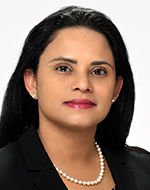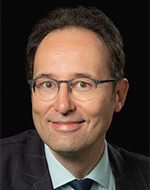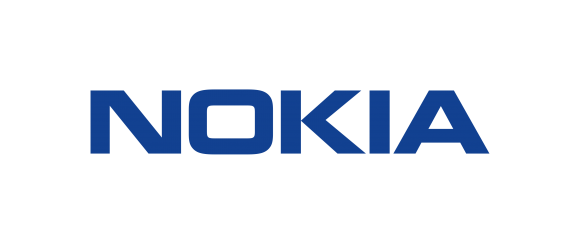TUESDAY, 26 APRIL 2022
| 11:45-12:30 | Keynote 1: 5G QoS Meets Cloud Networking
Room Magnólia, Chair: Prosper Chemouil |
 Marina Thottan
Marina Thottan
Bio: Principal Research Scientist, Amazon Marina Thottan is Principal Research Scientist at AWS Amazon. Prior to joining Amazon, she was Vice President of Network and Security research at Bell Labs. Marina has contributed to a wide variety of research areas, including Content Distribution, Routing protocols, Data over Optical networks, High Speed Router Design, Network Management, Anomaly Detection and Smart Grid Networks. Most recently she has been leading research work on 5G End-to-End Network Orchestration and Network Slicing. Marina received a Ph.D. in Electrical and Computer Engineering from Rensselaer in 2000. She has published over 60 papers in scientific journals, book chapters and conferences and holds several patents in the areas of network management, interactive network applications, routing algorithms, data analytics and network architectures. She is co-author of the book “Communication Networks for Smart Grids: Making Smart Grids Real” and has also Co-edited a book on “Algorithms for Next Generation Networks”. Marina is a Bell Labs Fellow and an IEEE Fellow.
WEDNESDAY, 27 APRIL 2022
| 11:00-11:45 | Keynote 2: 6G architecture challenges: how to build a fully automated and cloud-friendly mobile network
Room Magnólia |
Abstract: This talk tries to make some assumptions on the KPI requirements of the coming 6G mobile networks and describe the main challenges, with a strong focus on architecture and simplification. So far the mobile architecture was quite similar from generation to generation as a main result of the stability of the requirements: the strict (law-enforced) guarantees needed for voice communication and the (so far) quite stable end-to-end transport protocols used for reaching the servers on the Internet. But things are changing: cloud-based implementations can simplify the architecture even if the requirements don’t change drastically. And requirements might change too: Internet protocols have evolved significantly, emerging new use cases are coming - with potentially quite different communication patterns. So maybe it is time to reevaluate some of the seemingly very old and stable assumptions and design a simpler, easy to manage mobile architecture.
 Gergely Pongrácz
Gergely Pongrácz
Bio: Gergely Pongrácz graduated from the Technical University of Budapest in 2000. In 2004, he became a Research Engineer at Ericsson Research, where currently he is an expert in researching high performance networks. He is involved in cloud, NFV and SDN topics, especially in the programmable networking area, where besides Ericsson-internal activities he is leading several joint projects with universities. These projects resulted in well received papers and demos, such as a paper on the IEEE SigComm in 2016 or demos at several top conferences and the Mobile World Congress.
| 11:45-12:30 | Keynote 3: Network and Service Management for Achieving Truly Immersive Holographic-Type Communication
Room Magnólia |
Abstract: This keynote talk will first present a review of video streaming over telecommunication networks, and its evolution over time. The importance and the opportunities provided by volumetric media delivery will be outlined by means of several examples. The most appropriate management platform design for volumetric media delivery and the various challenges and possible approaches will be highlighted next. Finally an overview of research challenges and opportunities will be presented.
 Filip De Turck
Filip De Turck
Bio: Filip De Turck is a professor at the department of Information Technology (Intec) of Ghent University and imec, Belgium with expertise in communication software, network resource management, adaptive multimedia service delivery and next generation video delivery platforms. In this research area, he is involved in and successfully completed many research projects with industry and academia, served as Chair of the IEEE Technical Committee on Network Operations and Management (CNOM), former chair of the Future Internet Cluster of the European Commission, is on the TPC of many international network and service management conferences and workshops and serves in the Editorial Board of several network and service management journals. Prof. Filip De Turck regularly organizes international workshops on the above mentioned topics, serves as Editor-in-Chief of IEEE Transactions on Network and Service Management (TNSM), and steering committee member of the IEEE/IFIP Network Operations and Management Symposium (NOMS), the IFIP/IEEE Integrated Network Management (IM) Symposium, the IEEE Conference on Network Softwarization (IEEE NetSoft) and the IFIP/IEEE Conference on Network and Service Management (CNSM). He also served as chair of the IEEE SDN Initiative Conference Committee, which coordinates initiative IEEE events and conferences on Softwarized Networks. Prof. Filip De Turck was named a Fellow of the IEEE (Institute of Electrical and Electronics Engineers) for outstanding technical contributions to network resource management and adaptive service delivery. He is currently (co-)author of over 750 publications. He received the IEEE ComSoc Dan Stokesberry Award 2021 for particularly distinguished technical contributions to the growth of the network operations and service management field.
THURSDAY, 28 APRIL 2022
| 11:00-11:45 | Keynote 4: 6G meets future networking
Room Magnólia |
Abstract: While the deployment of 5G is ongoing, research towards the next generation mobile communication namely 6G has started recently. Next to novel radio concepts, 6G is expected to have a major impact on the way we operate networks, in particular. This presentation starts with opportunities and challenges of emerging networking paradigms such as in-network computing and programmable networks and puts them in a 6G context. Their contribution to meet the strict requirements for end-to-end 6G communication will be discussed. For 6G, we also see new paradigms taking a major influence on networking and we will elaborate on the role of AI and digital twin for future networking. Examples from ongoing research projects illustrate the findings and are a basis to derive further research challenges and opportunities.
 Wolfgang Kellerer
Wolfgang Kellerer
Bio: The research area of Wolfgang Kellerer covers methods and systems for communication networks as an infrastructure for the future of networking with a focus on the next generation mobile communication networks 6G. Focus of his research are flexible, dynamic networking based on Software Defined Networking (SDN) and Network (Function) Virtualization as well as wireless network resource management.
After studying Electrical Engineering and Information Technology at the Technical University of Munich (TUM), he obtained his PhD degree from TUM in 2002. After a research visit to Stanford University, USA, in 2001, he joined NTT DOCOMO’s European research institute (DOCOMO Euro-Labs) where most recently he served as the head of the research department for wireless communication and networking. Since July 2012, Prof. Kellerer is full professor at TUM. He is also an adjunct professor in the department of Informatics. He is member of the Wissenschaftlicher Arbeitskreises für Regulierungsfragen (WAR) of the Federal Network Agency of Germany (Bundesnetzagentur) and of the Board of Directors of the Center for Digital Technology and Management (CDTM). Prof. Kellerer is Senior Member of IEEE and serves on the editorial boards of IEEE COMST and IEEE TNSM.
| 11:45-12:30 | Keynote 5: Cloud-centric Networking - A Google Perspective
Room Magnólia |
Abstract: This talk outlines the user landscape and technologies driving the evolution of networking to a cloud centric world. We describe the key aspects of cloud-native networking where all network functions are composed of cleanly disaggregated {data,control,management} planes. We highlight some of the desirable properties such as formal verification, massive scale emulation, progressive roll-out, roll-back and roll-forward in the event of anomalous behavior, and intent-driven automation.
 Vijay Vusirikala
Vijay Vusirikala
Bio: Vijay Vusirikala is Sr. Director, Network Technologies at Google covering optical networking, demand forecasting, software systems for network planning/design, and network analytics.
Prior to Google, Vijay was in senior marketing, business development and architecture roles at Infinera, Motorola and Sycamore Networks covering core, metro and access products.
Vijay published extensively and holds 17+ patents. He has a PhD in EE from the University of Maryland, College Park and a BSEE from IIT, Madras







